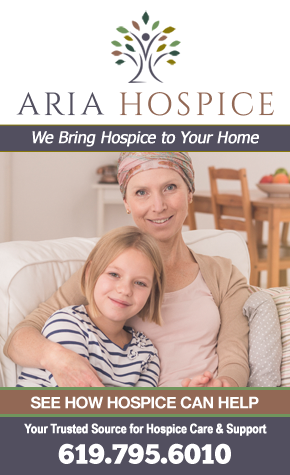“They treated my family member with a lot of love.”
![]()
Compassionate Hospice Care Serving San Diego County and El Centro
“They treated my family member with a lot of love.”
![]()
“Finally someone who understands and listens to a family’s needs and concerns. Thank you for your light when my family was in darkness.”
![]()
“I just want to say to Imperial County that Aria Hospice cared for my uncle and grandpa for all their needs. They were always on time and were very responsive. I can’t thank the nurses enough for the care provided and the office staff for always accomplishing our needs – thank you very much.”
![]()
“I would strongly recommend this place. They help me all the way and are very responsible for what they do. Always provided what we need and always in time they know what to do thank god you guys exist keep all I he good work a special thanks to Josephina she definitely understands and knows what we need – thank you so much may god bless you always.”
![]()

Aria Hospice therapists and counselors add an additional level of support to the integral care in hospice services Instead these practices as well as promote comfort and wholeness for both patients and their families
When appropriate Aria Hospice patients receive consultations with physical, occupational, and speech therapists if needed. Nutritional counseling is also available to assist with dietary health needs or concerns. Aria Hospice supports patients with dietitians who may be at a nutritional risk due to their physical health status or diagnosis.

Physical therapy may be part of a patients Plan of Care in order to assist with mobility and safety as well as to enhance quality of life. Often physical therapy can help a patient improve his or her strength. The physical therapist can provide direction to Aria Hospice skilled nurses, hospice aides and caregivers on basic exercises for safe mobility practices.
Hospice patients may feel vulnerable or insecure in performing simple daily tasks, or activities of daily living. (ADLs). Aria Hospice occupational therapists educate the patient and family on how to develop and maintain manual dexterity needed to perform activities of daily living such as bathing, grooming, eating and dressing.
In hospice, speech therapy may be used to determine a patient’s ability to swallow, allow a patient to eat properly or to assist them with verbal communication.
For hospice patients having the ability to communicate is important in keeping a patient engaged with family members, caregivers and medical professionals. In addition to helping improve a patient’s ability to communicate, speech therapists can educate caregivers and family members how they can help their loved one’s progress
When necessary, Aria Hospice may provide patients consultation and education on dietary requirements and intake. A dietitian is available as a resource to the hospice team members as well as patients and their families. Dietitians can help with the nutritional issues that are present in terminally ill patients as well as provide nutritional assessments of the patient, offer suggestions and recommendations for proper nutrient intake. They also inform and educate patients and family members about potential nutrition or hydration issues.
When you are faced with the challenge of finding a hospice provider to help care for the emotional and physical well being of someone you love, maybe your mom or dad, you will be faced with many questions.
Making the decision about hospice care for a loved one is never easy, but finding the right answers can help you feel more comfortable with the options available and confident in your final decision.
Aria Hospice operates hospice care programs throughout San Diego and Imperial Counties in Southern California. We pride ourselves on being one of the areas leading providers of end-of-life care.
Once a physician certifies that an illness is terminal, (a life expectancy of six months or less), they will collaborate with the Aria Hospice team for services, tailored to the needs and wishes of the patient.
Many patients have cancer, but Aria Hospice cares for individuals with many other life-limiting illness, including heart and lung disease, kidney disease, neurological disorders, stroke, Alzheimer’s and other dementias. Family and friends also receive the benefit of hospice care, to help them support the patient and adapt to changes in their lives.
Many people mistakenly believe that all hospice patients are bed-bound, critically ill, and unable to continue living life to the fullest. Hospice celebrates life and supports you in achieving your individual needs in this chapter of your life.
Contact our Admission Coordinator at Aria Hospice in San Diego County or Imperial County with any questions you may have about hospice care or eligibility.


When a physician determines that there is no curative treatment for a particular illness, the treatment is not helping any longer or you decide that the side effects of treatment are too great, you may consider choosing comfort care as your ultimate goal.
Aggressive medical treatment focuses on curing the physical illness rather than satisfying the patient’s emotional and spiritual needs. It often requires intensive care in a clinical setting that can diminish quality of life. Hospice care has the focus of comfort, by relieving pain and other symptoms, while continuing to address emotional and spiritual needs of both the patient and family.
Hospice care neither prolongs life nor hastens death, but relieves pain and physical discomfort so that the patient can experience a more peaceful and satisfying quality of life. At Aria Hospice, care is designed to primarily take place in the home or place of residence. Many families tell us that they waited too long to take full advantage of all the benefits offered by hospice care.
“They treated my family member with a lot of love.”
![]()
“Finally someone who understands and listens to a family’s needs and concerns. Thank you for your light when my family was in darkness.”
![]()
“I just want to say to Imperial County that Aria Hospice cared for my uncle and grandpa for all their needs. They were always on time and were very responsive. I can’t thank the nurses enough for the care provided and the office staff for always accomplishing our needs – thank you very much.”
![]()
“I would strongly recommend this place. They help me all the way and are very responsible for what they do. Always provided what we need and always in time they know what to do thank god you guys exist keep all I he good work a special thanks to Josephina she definitely understands and knows what we need – thank you so much may god bless you always.”
![]()
We are one of Southern California’s premier providers of end-of-life care. Click the button below to Request Information or call (619) 795-6010 to learn how hospice care can help.